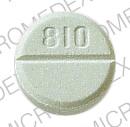Sorbitrate Side Effects
Generic name: isosorbide dinitrate
Medically reviewed by Drugs.com. Last updated on Jul 4, 2023.
Note: This document contains side effect information about isosorbide dinitrate. Some dosage forms listed on this page may not apply to the brand name Sorbitrate.
Applies to isosorbide dinitrate: capsule extended release, tablet, tablet extended release.
Serious side effects of Sorbitrate
Along with its needed effects, isosorbide dinitrate (the active ingredient contained in Sorbitrate) may cause some unwanted effects. Although not all of these side effects may occur, if they do occur they may need medical attention.
Check with your doctor immediately if any of the following side effects occur while taking isosorbide dinitrate:
Rare
- Bluish-colored lips, fingernails, or palms
- dark urine
- difficulty with breathing
- dizziness or lightheadedness
- fever
- headache
- pale skin
- rapid heart rate
- sore throat
- unusual bleeding or bruising
- unusual tiredness or weakness
Incidence not known
- Arm, back, or jaw pain
- blurred vision
- chest pain or discomfort
- chest tightness or heaviness
- confusion
- dizziness, faintness, or lightheadedness when getting up suddenly from a lying or sitting position
- fainting
- fast or irregular heartbeat
- sweating
Get emergency help immediately if any of the following symptoms of overdose occur while taking isosorbide dinitrate:
Symptoms of overdose
- Blurred or loss of vision
- bulging soft spot on the head of an infant
- change in consciousness
- change in the ability to see colors, especially blue or yellow
- cold, clammy skin
- convulsions
- disturbed color perception
- double vision
- fast, irregular, pounding, or racing heartbeat or pulse
- feeling of constant movement of self or surroundings
- halos around lights
- headache, severe and throbbing
- increased sweating
- loss of appetite
- loss of consciousness
- nausea
- night blindness
- overbright appearance of lights
- paralysis
- sensation of spinning
- slow heartbeat
- tunnel vision
- vomiting
For Healthcare Professionals
Applies to isosorbide dinitrate: oral capsule extended release, oral tablet, oral tablet chewable, oral tablet extended release, sublingual tablet.
General
The most common side effect was headache.[Ref]
Nervous system
Frequency not reported: Headache, dizziness, syncope, lightheadedness[Ref]
Cardiovascular
Common (1% to 10%): Decrease in blood pressure and/or orthostatic hypotension with reflex tachycardia and symptoms/signs of cerebral ischemia (including drowsiness and dizziness and weakness) with first time use and when the dose is increased
Uncommon (0.1% to 1%): Marked decreases in blood pressure with an aggravation of symptomatic angina pectoris, collapse associated with bradycardia and cardiac rhythm disturbances
Frequency not reported: Pallor, crescendo angina, rebound hypertension, hypotension[Ref]
Other
Common (1% to 10%): Peripheral edema in patients treated for left ventricular failure[Ref]
Dermatologic
Uncommon (0.1% to 1%): Allergic skin reactions
Very rare (less than 0.01%): Exfoliative dermatitis/Stevens-Johnson Syndrome or angioedema
Frequency not reported: Cutaneous vasodilation with flushing, excessive perspiration, rash[Ref]
Gastrointestinal
Uncommon (0.1% to 1%): Nausea and vomiting
Frequency not reported: Heartburn[Ref]
Endocrine
Very rare (less than 0.01%): Pituitary apoplexy in patients with undiagnosed pituitary tumors[Ref]
Ocular
Very rare (less than 0.01%): Angle closure glaucoma[Ref]
Respiratory
Very rare (less than 0.01%): Alveolar hypoventilation with consequent hypoxemia and the risk of developing a myocardial infarction in patients with coronary heart disease[Ref]
Hematologic
Frequency not reported: Methemoglobinemia, hemolytic anemia in patients with glucose-6-phosphate dehydrogenase-deficient syndrome[Ref]
Psychiatric
Frequency not reported: Restlessness[Ref]
More about Sorbitrate (isosorbide dinitrate)
- Check interactions
- Compare alternatives
- Drug images
- Side effects
- Dosage information
- During pregnancy
- Drug class: antianginal agents
Patient resources
Other brands
Dilatrate-SR, Isochron, IsoDitrate, Isordil Titradose
Professional resources
Other brands
Isordil, Dilatrate-SR, Isordil Titradose
Related treatment guides
References
1. Product Information. Isordil (isosorbide dinitrate). Wyeth-Ayerst Laboratories. 2002;PROD.
2. Cerner Multum, Inc. UK Summary of Product Characteristics.
3. Cerner Multum, Inc. Australian Product Information.
Further information
Always consult your healthcare provider to ensure the information displayed on this page applies to your personal circumstances.
Some side effects may not be reported. You may report them to the FDA.

